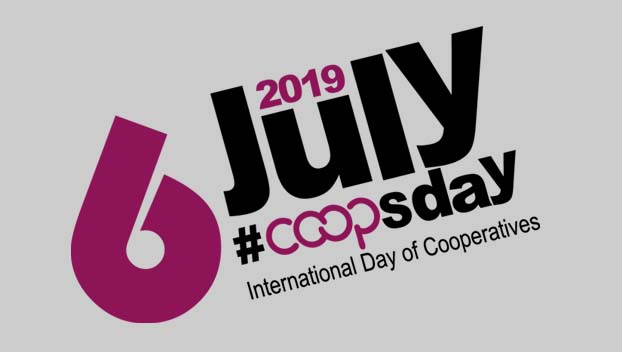The theme of the International Day of Cooperatives 2019 (CoopsDay) is COOPS 4 DECENT WORK. We are shouting out the message that cooperatives are people-centred enterprises characterized by democratic control that prioritise human development and social justice within the workplace.
“Cooperatives help to preserve employment and promote decent work in all sectors of the economy. Through participation, members have a motivation to change their lives, their communities and the world,” Ariel Guarco, President of the International Cooperative Alliance (ICA), has said.
On 6 July 2019, join us as we celebrate a future in which human development and social justice are priorities. Through #CoopsDay, local, national and global policymakers, civil-society organisations and the public in general can learn how cooperatives contribute to a decent working environment.
Cooperative employment is far from a marginal phenomenon. According to a recent estimate, cooperatives around the world employ or are the main source of income for more than 279 million people—almost 10% of humanity’s total working population.
Beyond these numbers, different studies have confirmed that, by comparison with employment in other sectors, cooperative jobs…
- tend to be more sustainable over time
- show a smaller gap in earnings between higher and lower-paid positions, and
- are more evenly distributed between rural and urban areas.
Stay tuned for the 2019 Coopsday interactive map and the Cooperators’ guide to the day itself, which will soon be available.
Why this theme?
Given today’s widening inequality, increased job insecurity and high unemployment levels, particularly among youth, the 2019 #Coopsday theme was chosen to support Sustainable Development Goal (SDG) 8 “Inclusive development and decent work.”
As people-centred enterprises and key development actors (European Consensus on Development, 2017), cooperatives have an important role to play in the creation of decent jobs and the social and economic empowerment of local communities. The second International Cooperative Principle, “Democratic member control,” enables communities to own and govern cooperatives jointly through democratic control that brings about inclusive and sustainable growth, leaving no one behind.
Because cooperatives are values-driven enterprises owned, controlled and run by and for their members, cooperative workers experience “a quest for efficiency, shared flexibility, a sense of participation, a family-type environment and a strong sense of identity,” as revealed in the series of interviews conducted in ten different countries around the world in connection with the publication Cooperatives and Employment: a Global Report.
The International Labour Organisation (ILO) is celebrating its centenary this year with a special focus on the future of work. In this context, the ILO and ICA will co-organize the conference, Cooperatives and the Future of Work, on Monday 24 June 2019, just after the 108th Session of the International Labour Conference.
About the International Day of Cooperatives
The United Nations International Day of Cooperatives is celebrated annually on the first Saturday of July.
The aim of this celebration is to increase awareness of cooperatives. The event underscores the contributions of the cooperative movement to resolving the major problems addressed by the United Nations and to strengthening and extending the partnerships between the international cooperative movement and other actors.
On 16 December 1992, the United Nations General Assembly passed resolution, which proclaimed the first Saturday of July 1995 as the International Day of Cooperatives, marking the centenary of the establishment of the International Co-operative Alliance. This year’s celebration will be both the 25th United Nations International Day of Cooperatives and the 96th International Cooperative Day.
Since 1995, the ICA and the United Nations have been setting the theme for the celebration of the International Day through the Committee for the Promotion and Advancement of Cooperatives (COPAC). It groups the ICA, the United Nations Department of Economic and Social Affairs (UNDESA), the ILO, the Food and Agriculture Organization (FAO), and the World Farmers’ Organization (WFO).



